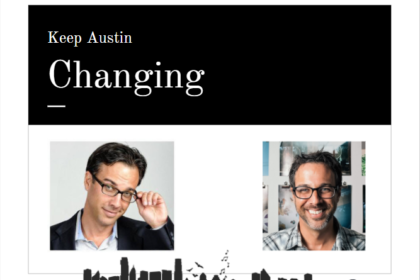
Peter Thiel, notable by way of PayPal, Founders Fund, and Zero to One, if you’re not familiar, noted once that, “a great company is a conspiracy to change the world.”
I was honored recently to be asked by one of Austin’s great mentors and investors, Ryan Merket, to keynote Amazon’s AWS Startup Day in Austin. He develops Amazon’s relationships between startups and AWS and, given Austin’s varied expertise (I’ll explain what I mean by that), it’s no surprise that Amazon is increasingly committed to Austin, TX.
To an exceptional Texas audience of around 1,000 at Austin’s Hyatt Regency, we talked about change.
Article Highlights
Conspire to Change
I’ve made a few major changes in my life, moving from Michigan to Arizona, taking a leap from there to Yahoo, getting married, jumping into startups, having kids, and finding my way to Austin. Changes affect our world, our world view, and if intentional and collaboratively undertaken, they change the world for the better.
I’ve changed. I share that set of photos of me above as they distinguish how Austin has changed me. On the left, shortly after my arrival from Silicon Valley, full of piss and vinegar as they say, I was honored to meet Morgan Flager of Austin’s Silverton Partners. I was clean cut, accustomed to the sport coat, and subconsciously had a little Clark Kent in me – Superman can change the world for the better, and he’s a rather invincible. That’s how I looked some 7 years ago. My reference to Morgan was a great coincidence as Amazon had asked Morgan and one of their newer Principals, Roger Chen, to close the day – Roger, formerly with Comcast Ventures, struck a chord in that context because of my work in MediaTech Ventures.
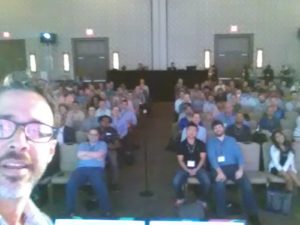 I stood on the stage the other week and took a group selfie. Not a very good one thanks to my camera but the point I wanted to make with the AWS oriented entrepreneurs is that SEEING what’s going on is what enables us to know where and how we can affect change. That’s a principal of what we’re doing in MediaTech Ventures – evangelizing the role of the media in technology and of technology in media; that in startups in particular, one rarely succeeds without the other. Evident in a simple, live, experiment, we took the selfie, tweeted it while on stage, and suddenly awareness of AWS Startup Day and my talking there blossomed to over 50,000. The innovation of technology, the fact that such a thing couldn’t be done 5 years ago, is what drives our economy.
I stood on the stage the other week and took a group selfie. Not a very good one thanks to my camera but the point I wanted to make with the AWS oriented entrepreneurs is that SEEING what’s going on is what enables us to know where and how we can affect change. That’s a principal of what we’re doing in MediaTech Ventures – evangelizing the role of the media in technology and of technology in media; that in startups in particular, one rarely succeeds without the other. Evident in a simple, live, experiment, we took the selfie, tweeted it while on stage, and suddenly awareness of AWS Startup Day and my talking there blossomed to over 50,000. The innovation of technology, the fact that such a thing couldn’t be done 5 years ago, is what drives our economy.

But invincible is not what we are, is it? We change. On the right, what I look like today; literally, as I stood on the stage in the same shirt. Notice the change. Austin has made me gray, I joked, I’m stressed for all of us by how little venture capital is available regionally. And, I meant that. Here we are in the hottest startup ecosystem in the world and yet the wealth in the region, wealthy individuals who would (should), one would think, support that identity, largely don’t. Interesting.
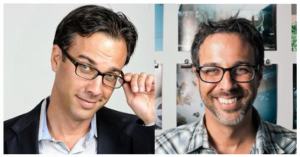 Don’t get me wrong, look at those photos. While I’ve grayed, Austin has changed me in ways that brightened my smile, loosened up my attitude, and brought a little art and culture into my world. Those two photos of me tell my story from Silicon Valley to Austin.
Don’t get me wrong, look at those photos. While I’ve grayed, Austin has changed me in ways that brightened my smile, loosened up my attitude, and brought a little art and culture into my world. Those two photos of me tell my story from Silicon Valley to Austin.
Amazon tells the same story. Granted, not based in Silicon Valley, neither in Bill Gates and Microsoft, those are companies frankly characteristic of American innovation – they are part of the ethos of “Silicon Valley” – if not there physically, certainly part of the identity behind the idea. Two great companies there, Amazon and Microsoft, that too have epitomized change – and changing the world.
| I started my career at Yahoo, in Mountain View, CA, and not coincidentally, the two relationships I helped develop in my time there were with Amazon and a little company in Austin called Dell. At the time, Amazon sold books and music.
If you think of the history of innovation in different regions of the world, you can see a progression of innovation such whereby skilled professionals, experienced entrepreneurs, investors, and the media, evolve from one technology to the next. They leverage what was done before to further change things. Note the thought in my slides above or here, a simplistic way of looking at it. |
Silicon Valley’s history of innovation:
- Radar & Microwave
- Microchip
- Computer
- Internet
- Smartphone
You can see why an eCommerce company from Seattle spent a lot of time working with Silicon Valley, and two decades ago, with Yahoo. One innovation led directly into the economy of the next.
We find ourselves now in Austin. All of those elements, my old Yahoo, Amazon in the Hyatt Regency, Dell up the road. The pattern though of local industry is different:
- First, predominantly, as a seat of Texas government
- Military and energy influences by way of San Antonio and Houston
- The Microchip and the Texas Instruments, Motorola, Freescale era
- Then the live Music capitol of the world
- When I arrived in Austin – Enterprise Software – and it was frequently heard that “Austin doesn’t do consumer” and I wondered if Austin even knew what it was doing since “Enterprise Software” was a dead term, now internet based SaaS, and Austin was, in fact, doing a lot in consumer tech, in video games, in Dell, and more. Something was disconnected.
- Today Austin’s food & beverage and CPG industries are booming
There has been a thread of technology and innovation throughout those but the pattern of which the economy builds is less obvious. Interesting.
“Is there a correlation there?” I asked. Consider, it’s easy to appreciate how the people who built the semiconductor, figured out the computer, and as a result of that, the internet, and since we have the internet, let’s make it mobile. Skilled professionals, experienced entrepreneurs, investors, and the media, evolve from one technology to the next.
We have to SEE what’s going on to enable us to know were and how we can affect change; to be successful entrepreneurs. Is that what’s hindering investors…?
What we perceive about Austin is perhaps not even those industries I’ve distinguished. What we perceive about Austin is what’s drawing everyone here: excellence in education, still a seat of politics, real estate development, music & entertainment, sports & wellness, food & beverage. We don’t see the Google and the HP and the Oracle as much as we see the UT at Austin, sprawl and debate about housing and traffic, SXSW and ACL, Deep Eddy Vodka and BBQ.
Is what we talk about by way of Austin inconsistent with where the jobs and innovation are actually found?? Are we unsure of where Austin thrives not because it’s not thriving (that’s certainly not the case) but because we keep changing its identity of innovation? I’m not saying that’s the case, I’m thinking about this, with you, and I want to encourage you to do the same… is it not reasonable that fractures and inconsistencies in how people perceive Austin CAUSE investors to avert opportunity?
Keep in mind, I’m not talking about VC Funds and active angel investors. Silverton, as our example in the day, has long had a great impact on Austin. I’m talking about the wealthy individuals in the region who aren’t as participatory. If you KNOW oil & gas or it’s certain you can turn an exceptional Return on Investment in real estate, is taking a risk on startups and technology not far greater for you when it’s hard to see exactly what it is that we do well?
We have to tell the stories of our past and present. We have to know our history and that progression of innovation. We have to be able to see the pattern of opportunity. And, frankly, Austin has some challenges it’s working through.
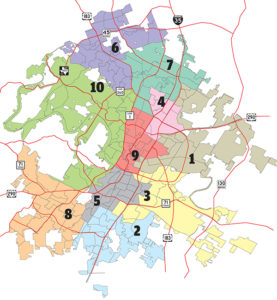
Take a look at a city map with the Districts and transportation infrastructure apparent – not the challenge the startups and technology, but an idea that we make a little harder to collaborate and work together.
I see Districts that look like gerrymandered political zones. White spaces where residents aren’t even considered part of Austin – notably on the west side where a tremendous about of wealth is found. Look to the South and East of Austin and we see breaks in mobility – making other parts of Austin less accessible. Why might that matter in this point of view?? The technology jobs and experience are in NW Austin while our startup community explodes downtown where things are least accessible to everyone else. Money on the west, Tech experience to the north, creative talent and many minority groups to the south and east. Huh. Interesting isn’t it?
Have you ever looked at where the Venture Capital in Austin is found? Coincidentally, as it’s green on the District map, it’s largely in District 10. 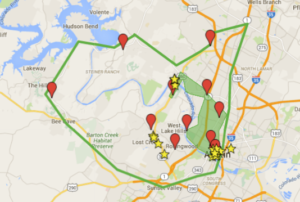 Not only remote from the East side but where it’s notable that there isn’t a direct line into the urban core.
Not only remote from the East side but where it’s notable that there isn’t a direct line into the urban core.
Does that matter? Yes, it matters. How often does a banker come across town to meet with your business to give you a loan? Capital being simply remote from innovation means it is less intimate with it. It’s harder to see the patterns and opportunities in the economy so as to better fuel it’s growth.
“Damn Paul, Doom and Gloom!”
Actually, no. Precisely the opposite. Austin is changing, drastically. Rapidly. The 35 freeway corridor with San Antonio is the fastest growing metropolitan region in the country. We talk about how fast Austin is growing because it’s what we see (there’s that thought again, our perceptions matter) and we don’t really appreciate that Cedar Park, San Marcos, Buda, Georgetown, Dripping Springs, and more are all exploding.
Knowing where Austin excels and enabling access to those stories, the people, and the opportunity is the key to serving investors who would (should) support are economy. And that’s exactly what’s starting to happen.
That’s the state of Austin today.
Rubén Cantú, founder of Austin’s LevelUp Institute and SocialGood.us, shared a couple articles that helped me see the implication: First, our interests in oil are dying – that comes as no surprise to most but that’s still a great and timely article from perspicacity.xyz’s Seth Miller. That’s a lot of wealth in Texas looking for a new home. Second, Something Extraordinary Is Happening in the World, And Most People Haven’t Noticed. Something in particular: We are finally figuring out what the Internet is.
Bluntly, that’s true of Austin. Now, I expect I’m going to get all the examples of where Austin has had great success online – and that’s not inconsistent with my point: In the history of regional innovation Silicon Valley (thanks to the large internet properties), and in New York, by the way, (thanks to their substantial Advertising and Marketing industries) everyone was ushered online right through the dawn of the internet. Jobs depended on it and the press/media always talked about it as though it were the only thing pertinent.
As result, everyone there knows how search engines work, how to use WordPress, and they’re all on Facebook. More or less. What unexpectedly shocked me when I moved to Austin was how prolific the “how to do SEO” and freelance web site development communities were – in my bubble in the Valley, I rather presumed everyone was chugging right along at about the same stage of technology and that every business, everywhere, was doing the web right.
The beauty of the internet is that it’s essentially an immediate connection between people and data. Fractured and silo’d regions of the world are all but immediately disrupted when everyone gets online. And that’s what’s been happening in Austin – truly something that simple. In my own Austin neighborhood, I launched the first Facebook Group – one didn’t exist!? – and suddenly everyone in the neighborhood knows what’s going on. We’ve started the Austin Startups group, the Austin Entrepreneurs groups, more meetups, and some of us have been pushing that further, starting Texas Startups – connecting the entire region so that no one is stuck in a silo or without access to the experience and capital that they need. No one need struggle to learn how, they can do.
We are figuring out what the internet is and is evident in the fact that Austin is largely a data science hub of the economy.
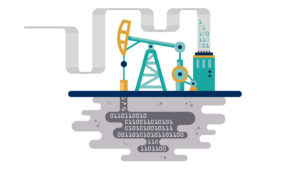 Amazon Web Services drew such a turn out of entrepreneurs from throughout Texas because everyone in that audience KNOWS that data is the key. Data is the key to seeing what we should and could be doing. Data is that which upon the new economy is built.
Amazon Web Services drew such a turn out of entrepreneurs from throughout Texas because everyone in that audience KNOWS that data is the key. Data is the key to seeing what we should and could be doing. Data is that which upon the new economy is built.
Philip Wheat, Mary Williams, Debbie Cerda, Devdatta Kilkarni, Gregory Godreau, Ashley Herr, Imran Charania, Tim Di Lauro, Rich Larrabee, Christopher Douglas, Brandi Clark Burton… I met such a diverse group of entrepreneurs in one fell swoop thanks to Amazon, it substantiated that this, herein, is what it’s all about.
Data is the new Oil.
Information is what enables us to explore this economy right? It’s how we can ask the question above – is there a cause and effect of our minority entrepreneurs largely being distantly located from the tech experience and wealth? I’d argue yes. Is there an implication to our being inconsistent in distinguishing what Austin IS and aligning that with our industries? Are we really the live music capital of the world? Do we really want to Keep Austin Weird or do we want to keep Austin thriving and changing the world?
Should we not conspire to build a city that changes the world?
Companies like Cognitive Scale, Risk Pulse, Data.World, Spredfast, Umbel, and Trendkite are validating that for us. They’re showing us what is getting funding. Insight to economies through technologies that Silicon Valley didn’t conceive of building.
Amazon Changing and Being in Austin SHOWS us our Future
Think about Amazon. When I started working online they sold books. They didn’t sell computers then, Dell did – efficiently and more effectively because of data about the market – showing them the potential of the internet: eCommerce. But everyone focused on what Silicon Valley was doing then because they were enabling the audience and the commerce technology upon which the economy today is built.
This morning my house told me I needed to leave early for work because Alexa knows my commute, the traffic, and the weather. Tomorrow a drone with an Amazon logo is bringing me a new Wrangler shirt so I don’t have to wear the same one every time I speak (okay, that’s not really happening, yet. Actual conspiracy or change in progress?). What is true though is that the day after tomorrow, I’m going to walk into Whole Foods and walk out without paying at the register.
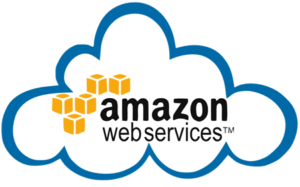 Austin is characteristically exactly what Amazon is about. From Book People; to Dell; to figuring out the internet; to IoT; to innovations in drones; to Whole Foods. Austin is a hub of eCommerce (that’s what we do) with BigCommerce and Volusion, BazaarVoice, RetailMeNot, and Rivet Works – Food and Local Grocers we love – Smarthomes and innovation in the house thanks to all the new development – all powered by data, both as in Amazon, and in our economy, showing us what works and what we do well.
Austin is characteristically exactly what Amazon is about. From Book People; to Dell; to figuring out the internet; to IoT; to innovations in drones; to Whole Foods. Austin is a hub of eCommerce (that’s what we do) with BigCommerce and Volusion, BazaarVoice, RetailMeNot, and Rivet Works – Food and Local Grocers we love – Smarthomes and innovation in the house thanks to all the new development – all powered by data, both as in Amazon, and in our economy, showing us what works and what we do well.
How we Conspire
Foster change.
People moving here, to Austin, from New York, Michigan, India, Ireland, Mexico, Ukraine, South Africa, and Silicon Valley are among my favorite people. Keeping Austin anything is the antithesis of entrepreneurship. Well, other than Keep Austin Changing, Growing, and Thriving. The challenge Austin has isn’t in the demand for people wanting to be here, it’s in our embracing the investments that need to be made in infrastructure, diversity, and regional development to help everyone thrive and change the world.
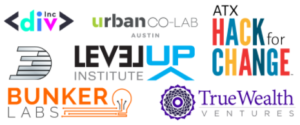 This is one of my absolutely FAVORITE set of logos in Austin. All of these relatively new entities in town that recognized the gaps, saw the disparities, and set about fixing things. That’s what Austin is about. That’s what the data enabled us to see, as we woke up to it, that portions of our population are struggling to get connected in, to learn, and to thrive in our internet dependent and data based economy. DivInc, Urban Co-Lab, ATX Hack for Change, Diversity Fund, LevelUp Institute, Bunker Labs, and True Wealth Ventures are among our most precious resources as they are committed to fixing the fractures that stifle the economy and hold back investor confidence. Truly, investors don’t seek an opportunity based on customers and revenue metrics alone!! When it’s obvious that our ecosystem is making it difficult for talent to work, any savvy investor appreciates that it means the talent pool for startups is limited. We MUST change that. We are.
This is one of my absolutely FAVORITE set of logos in Austin. All of these relatively new entities in town that recognized the gaps, saw the disparities, and set about fixing things. That’s what Austin is about. That’s what the data enabled us to see, as we woke up to it, that portions of our population are struggling to get connected in, to learn, and to thrive in our internet dependent and data based economy. DivInc, Urban Co-Lab, ATX Hack for Change, Diversity Fund, LevelUp Institute, Bunker Labs, and True Wealth Ventures are among our most precious resources as they are committed to fixing the fractures that stifle the economy and hold back investor confidence. Truly, investors don’t seek an opportunity based on customers and revenue metrics alone!! When it’s obvious that our ecosystem is making it difficult for talent to work, any savvy investor appreciates that it means the talent pool for startups is limited. We MUST change that. We are.
Without diversity – not just of people but also of thought and experience, of origin as people move here, we can’t be innovative. If you want to make that difference and realize that change not just for Austin but for the world, that’s wherein you should be investing your time and wealth.
How We Know it’s Working
As though the city were a startup, the validation is in the increasing demand from and for Austin from other markets.
Entities coming into Austin validate that the opportunity is here. Important though, is noting, seeing accurately, the data showing us what’s coming here and how that might be different than before.
Amazon is growing here, so is Google, and gaming companies, media brands, and more. Companies have long moved here though.
Venture Capital interests are still here, from elsewhere, but you might have experienced and recall that in the 90s, a good number of VC firms based elsewhere actually had offices here. That’s not the case today – yet.
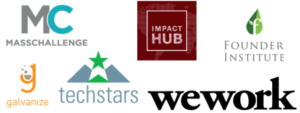 What’s coming into town are the startup programs and resources that catalyze entrepreneurs to reach investors, mentors, and partners throughout the world. What’s been coming into Austin in the past few years, are the entities willing to make an investment in Austin’s future. That’s the signal that matters!
What’s coming into town are the startup programs and resources that catalyze entrepreneurs to reach investors, mentors, and partners throughout the world. What’s been coming into Austin in the past few years, are the entities willing to make an investment in Austin’s future. That’s the signal that matters!
MassChallenge from Boston, techstars from California, Galvanize from Denver, Impact Hub, Founder Institute, and WeWork are all bringing with them their experience, networks, and resources to meet the demand and opportunity of the Austin startup community. As those thrive – Investors follow. Amazon and other corporate development interests invest in supporting the local ecosystem of startups.
Keep Austin Distinct
Conspire to distinguish what we really do well, where we do that, and collaborate in supporting that innovation from idea to exit.
I appreciate the concern Austin has for the growth – lost culture, gentrification, higher costs, etc. But the key is to not stifle the growth but rather plan for and foster it so that we can retain why everyone wants to be here in the first place!
Recall those perceptions we have of why we love Austin – Education, Politics, Real Estate, Music & Entertainment, Sports & Wellness, Food & Beverage. How do those characteristics of Austin’s appeal translate to our industries of strength? How do we transform what Austin has tried to be, in Enterprise Software or Live Music, and instead converge what we love about Austin with what we do well in innovation and jobs??
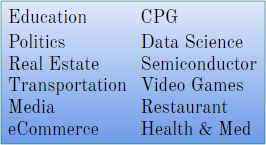 Here’s how I think that might look. Look at those industry verticals – does that not largely distinguish what Austin does well for the world economy? Those are where our jobs, companies, startups, and investment are most frequently found. No?
Here’s how I think that might look. Look at those industry verticals – does that not largely distinguish what Austin does well for the world economy? Those are where our jobs, companies, startups, and investment are most frequently found. No?
Should therein not be our focus on innovation and as a startup community? EdTech a transformation of Education alone should be centered in the country around Austin! Innovation in real estate – coworking, transporation tech, and smarthomes – where else in the world are we building so fast, investing so much, and causing challenges requiring entrepreneurs who can solve them? This is the work we’re focused on in distinguishing MediaTech for Austin through MediaTech Ventures – we’re not just Music, or Film, or Video Games, or VR: Austin is all of that and the innovation of it.
We must create efficiency of scale, expose and promote what we’re really doing well, and enable our community to thrive throughout those industries so that investors are drawn to greater opportunity, as seen through our excellence and validated by data. That solves the investment gap for local startups – aligning an idea with the RIGHT mentors, experienced professionals, companies, resources, and even convenience so that entrepreneurs and working professionals can participate efficiently and most effectively.
Austin’s Future (no, Austin’s Present)
When we look at the map of Austin, conspiring to change means not thinking along Districts nor epicenters but rather where jobs and entrepreneurs ALREADY thrive relative to what they do.
T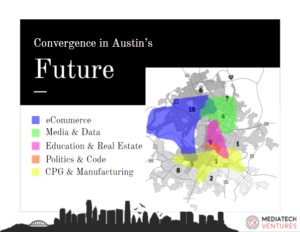 here is an economic map that needs to exists – economic zones intentionally designed to ignore city boundaries and focus only on education, jobs, capital, and innovation pertinent therein. People can then gravitate to where they can find the work they do and investors can focus on the opportunities familiar to them. This doesn’t happen overnight and certainly won’t address every challenge but in time, such thinking enables us to preserve Austin’s character, enable people to live/work efficiently, and drive investment by distinguishing and creating cohesion therein.
here is an economic map that needs to exists – economic zones intentionally designed to ignore city boundaries and focus only on education, jobs, capital, and innovation pertinent therein. People can then gravitate to where they can find the work they do and investors can focus on the opportunities familiar to them. This doesn’t happen overnight and certainly won’t address every challenge but in time, such thinking enables us to preserve Austin’s character, enable people to live/work efficiently, and drive investment by distinguishing and creating cohesion therein.
It already looks a bit like this map. I haven’t looked into every industry in which Austin has distinction, opportunity, and strength but it’s not hard to see that, for example, everything going on in eCommerce is where I’ve highlighed in blue – if you want a job, mentorship, or investors for something in that context – go there! Our Urban Core is largely dominated by our political and education roots so our work in EdTech and political data platforms are suited in that zone. My work in Media Innovation is uncovering that while our music and film scenes have been central or spread throughout – most of the media companies, capital, and experience are north and east – if you’re a startup, isn’t that where you should be?
Not Necessarily “Austin”
35 to San Antonio is the fastest growing metropolitan region in the country and granted, if you’ve lived in Austin forever it may seem far but if you’ve lived on the coasts, you appreciate that we’re essentially one place.
Healthcare industry and Cybersecurity is enormous just down the road from Austin while San Antonio is and will always be a major tourist destination – ideally suited for startups working in travel and hospitality.
Data, the new oil, is uncovering the wealth and opportunity in Texas. Just as oil did before now.
“Austin-based real estate startup Opcity raised $27 million in a Series A round,” earlier this year – Real Estate tech. Noted S3’s Charlie Plauche, “It was much stronger than the first quarter, we had a slow start in the first quarter, but that was not indicative of the strong deal flow happening in Austin and across Texas.”
While Venture Capital throughout the country is seeing a slowing, Texas is turning the other way. Why??? Because we’re getting it right. Because we’re addressing our challenges, embracing the internet, pushing diversity, distinguishing our excellence, and fostering regional efficiency so that people participate effectively.
“Tom Ball, Managing Director of Next Coast Ventures, “We’re hoping that translates into the start of more companies. We also continue to see firms from the West and East Coast show up in town to look at deals with us, which we think is a very positive indicator for the health of Austin’s early-stage tech community.”
A ha! Those changes we’ve been making are building companies. Companies draw investment in innovation and entrepreneurship.
That’s the state of the Austin startup community. Change. Precisely what it means to be a startup community – embracing and enabling change so as to create opportunity.
Most importantly perhaps, create opportunity validated by those local investors who’ve not been active. What’s exciting at the end of the day is seeing that Austin’s own Venture Capital community is growing at a rate faster than perhaps any since the 00’s. We’re getting it right, evident in local VCs all, Silverton Partners, PTV Healthcare Capital, LiveOak Venture Partners, S3 Ventures, NewChip, True Wealth Ventures, 1839 Ventures, CAVU, Sante Ventures, Geekdom Fund, Next Coast Ventures, WPP Ventures, and Diversity Fund, raising money. One of the most exciting experiences I had in the day was listening to a breakout session from NewChip founder Ryan Rafols – a new voice in the funding community – he held what is easily characterized as one of the best how to raise money talks I’ve heard in years – diversity of thought and experience, teaching. He noted, too, the incoming programs like, Founder Institute, being the assets of our economy validation that we’re getting it right and resources to do it better for investors.
Let’s conspire to change Austin, for the better – for the world.
I took that photo from the Austin Startup Day stage and from 1000 or so people in the room to 50,000, because of innovation in media, the world knew that Austin’s brilliant tech professionals were in Austin with Amazon.
Why? Because Austin is taking us where the economy is going next and where that fact is obvious in our culture and innovation is in what we’re doing with such photos, our stories, and our experiences – thanks to Austin innovation, we’re enabling ways to capture the experiences people have in life, to collect them, and celebrate all of the stories that share an experience like the one I had thanks to my experience from Amazon to Austin:
I want to invite you to join me in such discussions live and together.
Join me online here

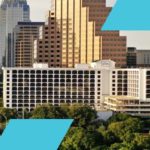
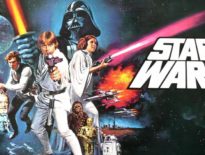
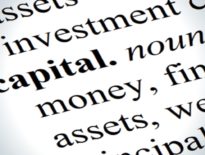
Paul – this is a great article, thank you for sharing
“Data is the new oil.” Love this!
Paul O’Brien’s excellent overview of AWS Startup Day Austin, and outlook for our community
Thanks for the shout out Paul! Definitely gonna change the Austin game together ???
Let’s do this! 😀
Great stuff Paul!
Thank you for the shoutout my friend! #diversityintech
Great post Paul –thanks for articulating this opportunity/inflection point for Austin.
This was a great presentation last week – I’d recommend to any Austin entrepreneurs and startups. Thanks, @seobrien! #startups #atx #aws
Makes my head explode thinking about the potential! And what we need to conspire to accomplish to realize it. Thanks Everyone!!
Same here — but in a great way! The caveat of “garbage in, garbage out” is critical though. Making sure that we are capturing the RIGHT data, i.e,, which parameters, setting baseline, a representative sample size, etc. to transform data to information.
Paul thank you so much for stepping up with short notice and knocking it out of the park! Super impressed. ?
Thanks Paul – was wonderful sharing ideas and hope to share more!
Good event, good talk, and thanks for sharing the presentation!
Yes. In full agreement.
Now how does someone average like me contribute to the change???
Just keep doing what you’re doing Lani Rosales. Austin needs leadership and voices like yours!
Tthis shold be a “how it started” and “how its going” pic